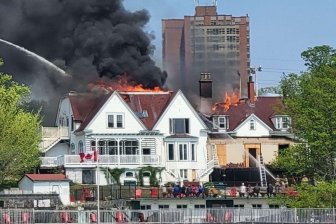Amidst a perfect storm of staffing shortages, escalating burnout rates and upcoming summer vacation time, Canada’s health-care system is grappling with a mounting crisis that may lead to longer patient wait times and more emergency room closures, experts warn.
On Wednesday, Niagara Health said its urgent care centres in southern Ontario will no longer operate overnight as it faces physician staff shortages. And on Thursday, the hospital in Minden, Ont., permanently close the local ER, due to a strain in staffing.
Last week, 180 ER doctors across Calgary penned an open letter sounding the alarm over the state of emergency care in that city.
While staffing challenges extend far beyond Ontario and Calgary, the impact is most acutely felt in rural areas where the influx of cottage-goers and camp enthusiasts intensifies the strain on already stretched resources, warned Dr. Raghu Venugopal, an emergency room physician in Toronto.
“Summer is a high-volume time. In the medical profession, we really just keep on working because the patients keep coming. Emergency rooms have to be staffed,” Venugopal told Global News.
“And the kind of accidents that happen in rural communities can be significant … serious highway injuries, agricultural industry industries. These are very serious injuries that need timely care,” he said.
Last summer, a number of hospital emergency rooms across the country had to temporarily close their doors due to staffing challenges.

In July 2022, six emergency rooms including one in Montreal were temporarily shut in Quebec; at least three were closed in New Brunswick; 14 hospitals in Ontario closed ERs, beds and ICU units; and a third of rural Manitoba ERs closed due to staffing shortages.
Venugopal predicts this will happen again this summer.
“Canadians will be waiting longer this summer. The crush on emergency services has outstripped the ability of the system to cope with it. And that’s, unfortunately, something we’re seeing in British Columbia, we’re seeing in Alberta, we’re seeing in Ontario, we’re seeing out east as well,” he said.
‘Funding has yet to flow to the front line’
The Canadian health-care system continues to grapple with the lingering repercussions of COVID-19 burnout and the unresolved staffing shortages from the previous summer, explained Alika Lafontaine, president of the Canadian Medical Association (CMA).
“We have definitely made progress, we’ve had the largest federal investment in health care since 2004. That money is starting to be allocated (to the provinces and territories),” Lafontaine said.
In February, the federal government announced a 10-year investment plan worth $198.6 billion, including $46.2 billion in new health-care funding for provinces and territories.
Ottawa also said it would provide an immediate one-time $2 billion top-up for this year to help provinces ease the intense pressure on emergency rooms and children’s hospitals.
“But the funding has yet to flow to the front line and make an impact on the shortages that people will witness as we go into the summer,” Lafontaine said. “And I think it’s really important to recognize that this isn’t just because of scheduled vacation, this is because our system has yet to recover and is still incredibly unstable.”
Until the federal funding gets to the front line, he warned there may be instability in hospitals for years to come.
“Every time that a cycle of crisis hits, it’s actually worse the next time. And so if this summer was bad for folks, it will probably be worse until we get to the work of actually getting these things stable,” he added.

Global News reached out to all 10 provinces about how they were preparing for ER staff shortages this summer.
Ontario renewed funding Thursday that helps rural and northern hospitals bolster ER staffing through the summer, but the program will end after this year, the government said.
B.C., Alberta and Quebec said they were concerned about the shortages and were looking to hire more front-line workers.
Manitoba said it’s working on diverting patients into more community health services, as well as ensuring coverage of staff during the summer. And Saskatchewan said it is making every effort to ensure patients in the ER are seen quickly and efficiently.
Meanwhile, New Brunswick said it was increasing wages and investing money to help address recruitment and retention challenges.
Prince Edward Island, Nova Scotia and Newfoundland and Labrador did not respond to Global News’ questions by the time of publication.
Cottage-goers lacking hospital access
Staffing levels in the summer can be particularly bad in rural areas, said Steve Flindall, an emergency physician in Ontario’s York Region.
“Many hospital staff members have to pull extra shifts or miss out on a vacation in order to cope with the overwhelming workload and compensate for the staffing shortages,” he said.
“And it’s just it’s a tough time of year because it’s also (when) a lot of rural volumes go up because people from the cities are heading to rural areas for vacation, like cottaging; so the smaller hospitals get more patients than they would in the other seasons, and their staffing is low.”

The closure of emergency rooms in rural areas, such as the one in Minden, poses a critical risk for many people, according to Venugopal, as the extended travel time to reach the nearest hospital can potentially mean the difference between life and death.
“It’s extremely serious because time-sensitive emergencies that require seconds (or) minutes to act on really matter,” he said.
These emergencies can range from acute anaphylaxis from a bee sting, peanut exposure, a chainsaw accident, or a drowning incident, he added.
In these cases, a paramedic may have to divert patients to another hospital because of the closure of nearby emergency rooms. He warned this situation can have serious implications, potentially leading to worsened health outcomes or even loss of life.
‘A recipe for a lot of waiting by patients’
A recurring solution within the health-care system during ER shortages is cancelling vacation time or asking staff to delay it, Lafontaine said.
“But a lot of folks are in their third or fourth cycle of summer where they haven’t gone on vacation or they’ve only had a few days and eventually everyone breaks,” he added.
“And some folks are actually walking away from their job where they’re not allowed to take a vacation and moving onto either a casual list or moving to a different part of the health-care system where they can have a better work-life balance, which literally means just being able to take some time off.”
One way to help ease the pressure on ERs, Lafontaine said, is by diverting patients to family physicians, walk-in clinics or even virtual care units.
But community services, like family doctors, are also in short supply across the country, meaning more people will have to access health care through emergency rooms, he said.

“ERs have always been a way for that unmet demand to be met,” he said. “And I think since we have such a problem with primary care across the country right now, pretty much every province and territory is struggling.”
Looking ahead, Lafontaine predicts this summer has the potential to be even more severe than the last.
“We’re going to see emergency rooms get even more overwhelmed,” he said. “And in the midst of this instability, that’s going to be a recipe for a lot of waiting by patients and in some cases, a lot of harm.”
— With files from Teresa Wright and the Canadian Press









More Stories
Improve balance and build core strength with this exercise
‘Sciatica was gone’: hospital performs robot-assisted spinal surgery in Canadian first | Globalnews.ca
Makeshift slaughterhouse in a residential garage points to growing concerns about illicit meat sales | CBC News